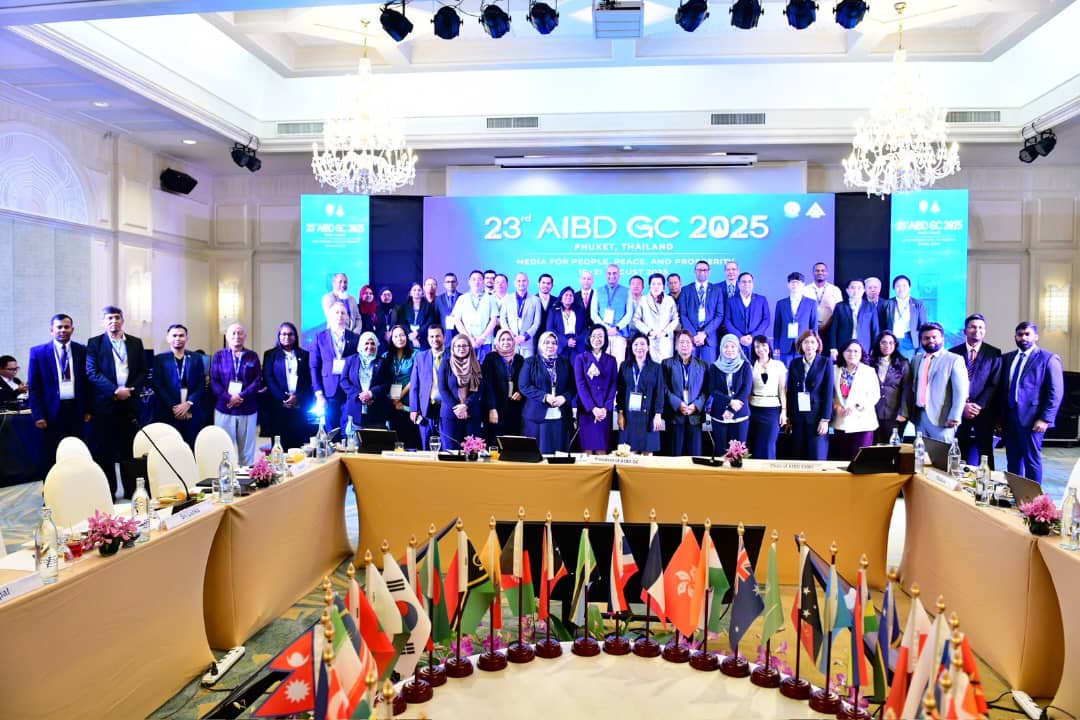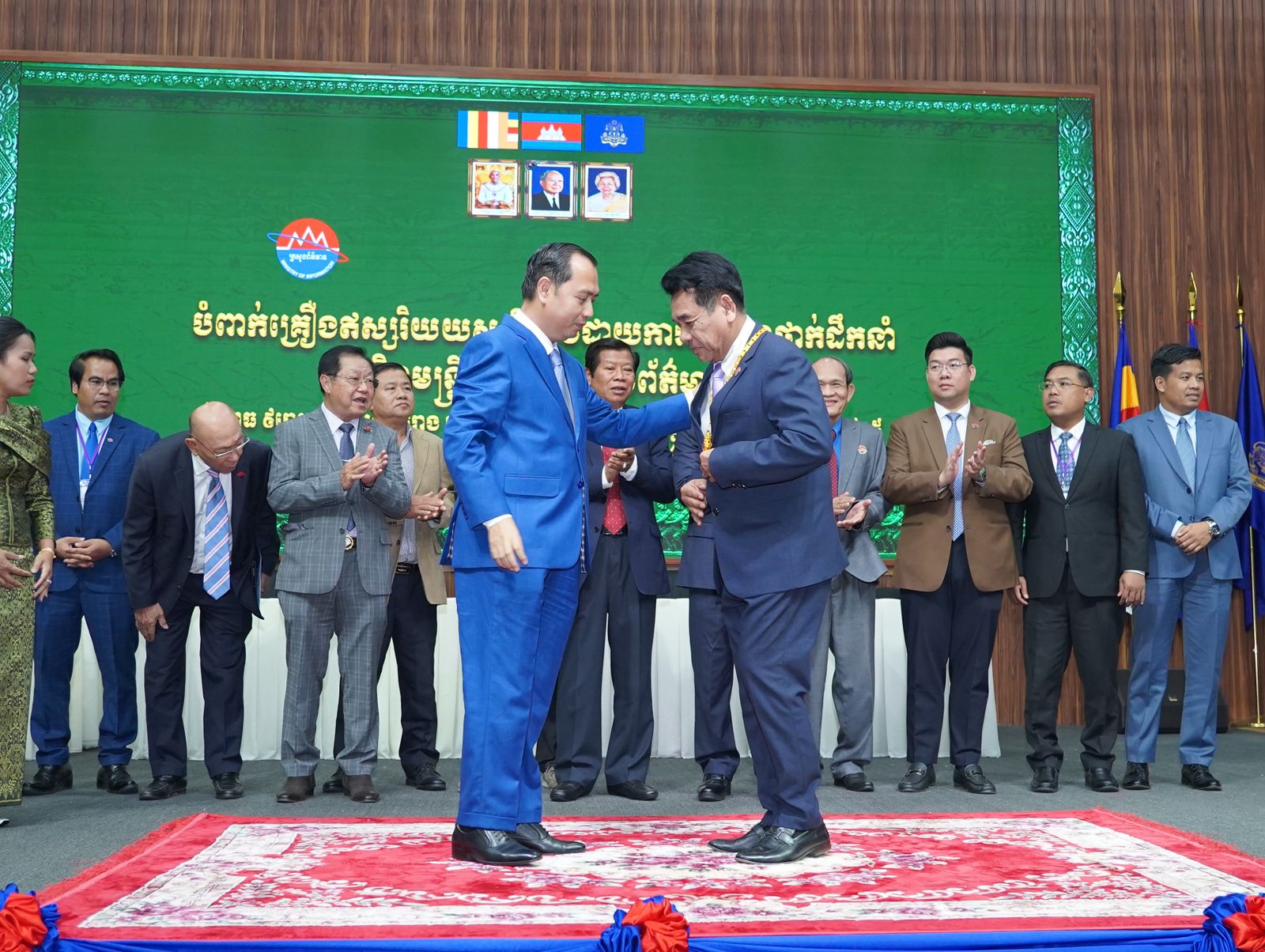AIBD’s Annual Performance Report
AIBD has successfully implemented its programme activities and initiatives during the last 12 months, notably the Asia Media Summit 2015 in Kuala Lumpur and the 27 training activities benefitting close to 700 broadcasters from 46 countries and regions in Asia-Pacific and beyond.
It has also pursued close collaboration with governments, international, regional and national broadcasting organisations, among them, the Tun Abdul Razak Broadcasting Information Institute of Malaysia (IPPTAR), Arab States Broadcasting Union (ASBU), Norwegian Broadcasting Corporation, ITU, ABU, EBU, CCTV and FES.

AIBD has successfully implemented its programme activities and initiatives during the last 12 months, notably the Asia Media Summit 2015 in Kuala Lumpur and the 27 training activities benefitting close to 700 broadcasters from 46 countries and regions in Asia-Pacific and beyond.
It has also pursued close collaboration with governments, international, regional and national broadcasting organisations, among them, the Tun Abdul Razak Broadcasting Information Institute of Malaysia (IPPTAR), Arab States Broadcasting Union (ASBU), Norwegian Broadcasting Corporation, ITU, ABU, EBU, CCTV and FES.
AIBD Director Chang Jin delivered this performance report during the 41st Annual Gathering /14th AIBD General Conference & Associated Meetings held in Chiang Mai, Thailand.
On training, the activities covered various fields such as new media and social media, management, children/gender/youth, digitisation, production and training of trainers, among others. Many of them were in-country workshops and self-funded.
On the Asia Media Summit 2015 in Kuala Lumpur, more than 400 delegates from 46 countries and regions participated in the three-day event. Many of its regular attendees considered it the best AMS so far in terms of the quality of content and speakers.
To record and disseminate the achievements of the AMS 2015, AIBD prepared the AMS “Main Documents and Summary” and sent them to partners and patrons who have shown keen interest in the Institute as well as the UN Secretary General. The July issue of the Broadcaster magazine, that carries a new graphic design, featured the Summit highlights. As proposed by the AIBD GC President and SPT, the Secretariat also revived the book publication of the AMS Proceedings.
The AIBD Director updated members on the preparations for the Asia Media Summit 2016 to be held in Incheon Korea, and successful holding of the 3rd International Conference on Broadcast Training on 5-6 February 2015 in Kuala Lumpur.
With the theme “Creative Content – Maximising Business Value and Audience Experience,” the two-day conference attracted more than a hundred local and foreign delegates.
Among its recommendations were for AIBD and its partners to help identify high quality trainers, offer new training methods for broadcasters and assist broadcast organisations develop innovative training techniques featuring new structures and new technologies.
Concerned about the number of AIBD members, AIBD is launching a more aggressive recruitment programme to attract new members in Asia and beyond.
It has currently 34 full members and 66 affiliate members, representing 48 countries and regions.
Under the agreement establishing AIBD, members and associate members of UNESCAP are eligible to become AIBD members. To date, only 26 of the 53 member states of UNESCAP are full members. Nine other member states and two associate members are affiliate members of AIBD.
The membership campaign will target the rest of UNESCAP member states, about 25 of them, to join either as full or affiliate member, as well as national centres and national institutes of broadcasting and organisations dealing with the electronic media.
AIBD has also plans to publish a hard copy Members’ Directory, and fine tune the internal personal structure of the Institute as part of efforts to achieve sustainable development.
The Institute remains ISO certified under ISO 9001:2008 and ISAS BCP 9001:2010, reflecting its competency and credibility in pursuing initiatives in media management systems.
In 2012, AIBD was certified for another three years until October 2015. The next re-certification audit is scheduled for 27-28 August 2015.
Reporting on the state of finance, Director Chang Jin said members’ arrears in subscription remain a concern that needs immediate attention. He requested members to settle their outstanding dues as soon as possible so as not to jeopardise the services of the Institute.
For nine member organisations suspended for nonpayment of their arrears in subscriptions, AIBD has recommended the termination of their memberships.
For new initiatives, AIBD is launching annual research projects in collaboration with members and partners. To start with, Director Chang Jin said the research topic could be related to the AMS theme and its outputs made available prior to the AMS for further deliberations and follow-up research.
The Institute is also pushing for the implementation of the secondment programmes aimed at expanding knowledge sharing in a unique way and enabling the Institute to gain new perspectives brought in by the secondee.
Under the programme, working professionals from member organisations will be attached as secondees for a period of two years.
In the fast-changing media landscape, AIBD wants to expand its membership and cover organisations engaged in new media.
To date, not a single new media company is an AIBD member. “It’s high time that we take new media into our agenda, and welcome organisations related to new media into our Institute”, Chang Jin said.




